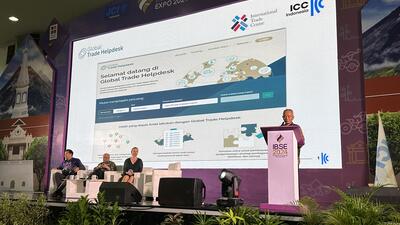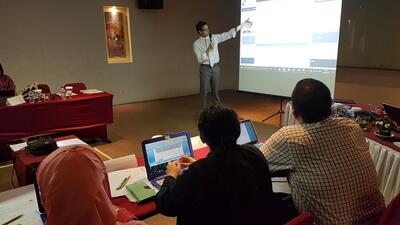Indonesian services sector finds its voice
Sondang Angraini, Government coordinator of ISD and Director, Trade in Services Negotiation in the Ministry of Trade, shares her perspectives with services sector stakeholders at an Indonesian Services Dialogue workshop in Jakarta in 2013. © Indonesia Services Dialogue
The Indonesian services sector has taken off in the last decade. Services account for about 54% of GDP and nearly 50% of employment. It is also the fastest-growing sector of the national economy, averaging more than 7% annual growth for the last decade and creating more than 400,000 jobs in 2011 alone, predominantly in small firms.
The significance of services for exports reaches well beyond actual services exports. Overall productivity and export competitiveness depend heavily on services sector performance. Services account on average for more than 25% of all intermediate inputs in Indonesia’s goods producing sectors. Services inputs account for a full 40% of the value of wood products, for example.
Against that backdrop, the International Trade Centre (ITC) is working with the Indonesian business community, the government and academic partners to help organize services firms to ensure they have an effective voice in policy making.
ITC support is focused on the Indonesian Services Dialogue (ISD), the nation’s fledging mechanism for high-level public-private stakeholder dialogue on services and its version of a coalition of services industries. ITC is supporting the upgrade of ISD’s corporate communications material, including its Internet site. ITC is working with ISD and other partners to map business organizations in the Asia-Pacific region which are specifically committed to the services sector and which have an interest in promoting services trade and investment.
The project will also document best practices in sustainable institution development and stakeholder engagement of services business organizations. These can be used not only by ISD but by similar institutions in developing economies in the region. It is hoped this resource will facilitate the first regional meeting of Asia-Pacific services industry coalitions later this year.
Shifting towards services
The services sector has been the forgotten player in Indonesia’s economy, said Chris Kantor, business coordinator for ISD and vice-chairman of both the Indonesian Employers Federation and the Indonesian Chamber of Commerce.
‘Services have to be part of the new strategic approach to economic growth because commodity prices are now lower for the foreseeable future and manufacturing is going to be much more services-intensive,’ he said.
The private sector needs to look more carefully at its interests in proper regulation, training and the importance of linkages between services sectors and agriculture, manufacturing and mining, Kantor said.
‘While the private sector is the natural leader, the idea of ISD is to bring all stakeholders together in this coalition,’ he said. ‘This includes services users as well as providers, regulators, policymakers, negotiators and researchers to provide more evidence-based discussion.’
'Indonesia's development strategy also needs to take into account the services sector’s linkages to goods production as well as the strong linkages between services sub-sectors,' said Jose Rizal Damuri, academic coordinator of ISD and head of economics at the Centre for Strategic and International Studies (see figure).
In developing economies such as Indonesia’s there is growing appreciation that moving quickly towards a strong services sector is an effective way to achieve social and economic development, said Ian Birks, chief executive officer of the Australian Services Roundtable, which also supports ISD through ITC.
‘The traditional approach to development is through agriculture and mining, and eventually after many years the services economy develops off the back of that,’ he said. ‘Many developing economies are recognizing that developing an internationally competitive services sector is a better way to improve economic performance.’













